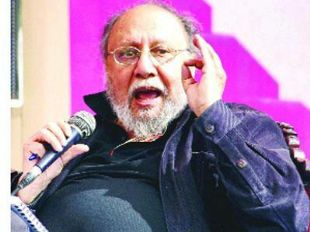 New Delhi, Feb 1: In some relief to sociologist Ashis Nandy, the Supreme Court on Friday issued a stay on his arrest over alleged anti-dalit remarks. The court criticized him for his statements but protected him for arrest by any state government.
New Delhi, Feb 1: In some relief to sociologist Ashis Nandy, the Supreme Court on Friday issued a stay on his arrest over alleged anti-dalit remarks. The court criticized him for his statements but protected him for arrest by any state government.
When Nandy's counsel said he had no intention of hurting the backward class, the court asked why then was he making such statements when he did not intend it.
The Supreme Court told Ashis Nandy to be careful in future and not make such statements, the meaning of which he did not intend to convey.
Nandy's statement at the Jaipur literature festival was not in good taste and that it had hurt many people across the country, the court added.
An advocate claiming to be member of Dalit community sought to oppose Nandy's petition seeking protection from arrest but the Supreme Court said his objection could only be considered once he files an application.
The court has sent notices to the governments of Rajasthan, Maharashtra and Bihar.
Nandy had earlier moved a petition seeking protection from arrest for an alleged anti-Dalit remark he made at the Jaipur Literary Festival (JLF).
Nandy had requested the apex court to quash all the FIRs registered against him.
"We are moving the Supreme Court for quashing of the FIR as well as laying down the guidelines in terms of something which constitutes an offence against SC/ST Act and something which is said in 'freedom of speech'," Nandy's lawyer Gaurav Kanth told the media yesterday.
"My main plea is because there is no intent when he had spoken these statements and as far as the SC/ST Act is concerned, there is no question of any harm or anything which has been caused to any particular member of SC/ST caste or community. So, we are moving in terms of the fact that nothing really constitutes any criminal or penal action," he said.
To a poser on why the police had not yet questioned Nandy in connection with this case, Kanth said that Nandy was all ready for cooperation in this regard.
Asserting that he has worked for Dalits, OBCs and adivasis for 45 years of his life, Nandy had earlier on Tuesday said that he was ready to go to jail if tried under the Atrocities Act and convicted.
At the literary festival on January 26, Ashis Nandy had said: "Most corrupt people come from the Other Backward Classes, Scheduled Castes and Scheduled Tribes."





Comments
Add new comment